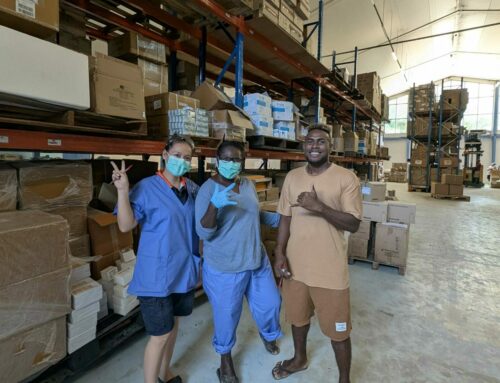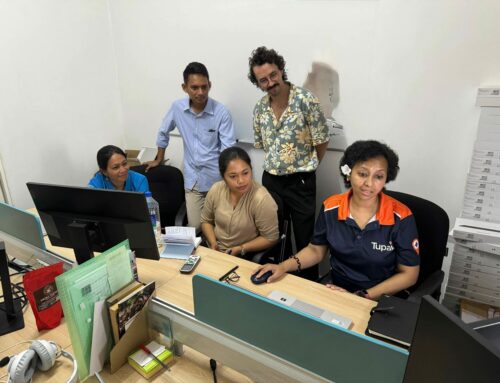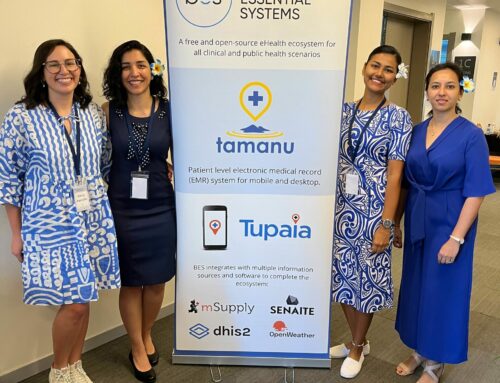Using local change champions to support innovation in similar contexts overseas can reap huge rewards. We’ve learnt some lessons but we think the evidence is mounting for more of the same.
I need to preface this story by emphasising that I am a pretty poor cricketer and somewhat worse at golf, so there is a caveat over the whole analogy. Each January though, I play in an annual pharmacy cricket carnival which is weighted (at least for the Victorian team) about 90% towards good fun and 10% cricket. We do occasionally win but only because of a ruthlessly competitive streak we develop when playing NSW…
Once, a few years ago, it occurred to me that I did not have cricket boots – in fact did not usually wear them – but that we were going to be playing games on wet surfaces following a fair bit of rain. I wasn’t going to run out and buy spikes for a few semi-social games of cricket but I was conscious of embarrassing myself with acrobatic displays of falling over. What to do? I looked into the cupboard and spotted the solution! My golf shoes – rarely worn and in pristine condition – sitting buried at the back of the cupboard. Now these were the sporting variety of golf shoes, not the heavy, tan leather variety favoured by my golfing grandfather in his day… well suited to a change in sports. Not what they were intended for… but available and ideal for the job. Short story – they were perfect! Nobody noticed a thing and I played out the carnival without falling over once (well, no more than usual).
Of course, I still didn’t take any wickets or make any runs – dropped a few catches – but let’s not let my lack of cricketing ability spoil a perfectly good analogy.
Sometimes the perfect option is sitting there staring at us – we just need to think laterally.
In 2016, we were engaged by the World Food Programme (WFP) to roll-out mSupply Mobile across 100 facilities in Timor-Leste. mSupply Mobile is an Android, tablet version of the widely used mSupply software, which is used for managing stock across health supply chains in 30 countries around the world. mSupply is important for the Australian aid program; it’s used in most countries in the Pacific, as well as Timor-Leste, Myanmar, Laos and Cambodia. We have been involved in rolling out mSupply Mobile to further strengthen the mSupply medicines management architecture in 6 countries across the Pacific in the last 2 years.
The roll-out in Timor was the fastest ever roll-out of mSupply mobile with solid take-up by staff and improvements in medicines availability throughout the first year. Much of the success came down to a young local IT graduate called Agusto Dos Santos, who we employed in 2016 and embedded in the Timor national medical stores (SAMES) specifically to support mSupply and mSupply Mobile.
Agusto came to us with no experience in health but he had worked in IT and telecommunications and interviewed exceptionally well so we’d taken a chance on him above some more experienced candidates. He grasped supply-chain concepts quickly, was strong on both software and hardware and interacted very well with colleagues across the spectrum – he was the key difference in ensuring the success of the project.
Fast-forward to late 2018 and Solomon Islands proposed a roll-out mSupply Mobile to 50 facilities across the country, including full-time, in-country support for 12 months to the implementation. Now – to be blunt – the usual paradigm in development in our region is to find an available Australian or New Zealander to come in and do expensive technical assistance. Sometimes this is great and often it’s completely necessary… but could we think laterally?
We looked around the region and universally decided that the best person for the job was Agusto Dos Santos, the young Timorese guy we’d taken on with zero experience just two and a half years earlier.
Here was an opportunity for south-south collaboration in action – we were keen to trial it, the Solomon Islands Ministry of Health and the Australian Embassy in Honiara were in accord and DFAT’s innovationXchange, the project funder agreed enthusiastically.
So – we’re 4 months in. How’s it going?
Unbelievably well.
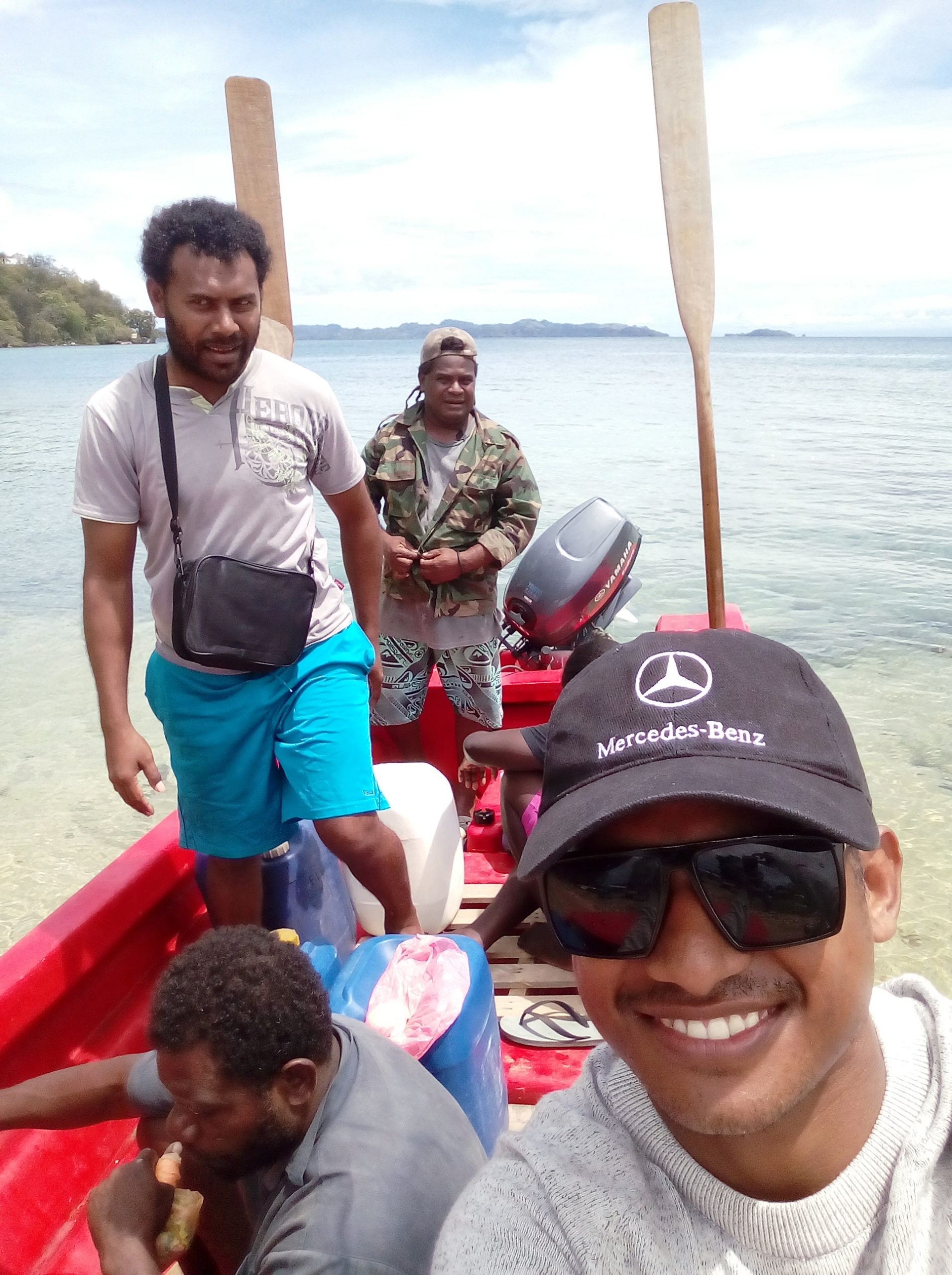
Agusto Dos Santos in Central Province, Solomon Islands
With the support of a strong Pharmacy Division in Solomon Islands, Agusto has led the implementation of mSupply Mobile in 15 facilities across 3 provinces already. They’re on schedule and under budget, with an anticipated completion date for installations by May and then 6 months of follow-up factored in. In Honiara City Council, every single public health facility is now using the system, along with every health centre in Central Province. 100% of new facilities are consistently entering data and 13/15 have completed subsequent stocktakes since implementation. Most facilities are entering data every single day.
How do we know? Well, we can see the data being entered in real-time! Because mSupply Mobile uses ‘sync’, connectivity problems do not affect data capture so there’s no excuse to not enter data. The system continues to work seamlessly, even without internet, for weeks or even months at a time.
When facilities have connection problems staff from the National Medical Stores are responding immediately by making sure tablet sims have credit. When internet completely drops out, it’s challenging but we know that when it comes back all the information entered over that time syncs automatically, with no data loss or corruption.
A subsequent success of the new mSupply Mobile network is improved communication. We know that communication has improved because we’ve installed the Telegram messaging service on each device – a lite version of WhatsApp that sends and receives encrypted messages. Thousands of messages are being exchanged every day between staff at the National level and across facilities in moderated conversations.
See, Agusto isn’t just rolling out a token program to be forgotten about – he’s leading the implementation of cutting edge, globally recognised technology that is having immediate benefits in a tough environment.
Agusto is getting along famously with the local Solomon Islands team, finding wonderful and unexpected cultural similarities but professionally bringing his experience and IT nous to a team that benefits enormously from both. Together, they’re approaching the work with an energy that put honestly, we simply don’t see with many other consultants. Agusto is in his late 20s and goes about his work with a huge smile and an infectious enthusiasm that you simply can’t teach.
The other benefit is that when Agusto is finished, he’ll take a wealth of experience home with him, with lessons to be applied back home in Timor-Leste. We hope to identify more ‘change champions’ and from our perspective, we hope Agusto is at the vanguard of an army of change champions being deployed to support Tupaia and mSupply from the countries that most benefit from these health innovations. Moreover, the concept is winning a lot of support within DFAT and we hope it’s increasingly replicated across different programs.
Of course, we know we’re not the first ones to succeed with south-south engagement but in health supply chains and health innovation, it’s been relatively rare in our region and we’re keen to start a conversation about how to enable more of it.
So what lessons have we learnt along the way and what criticisms do we need to overcome in the future?
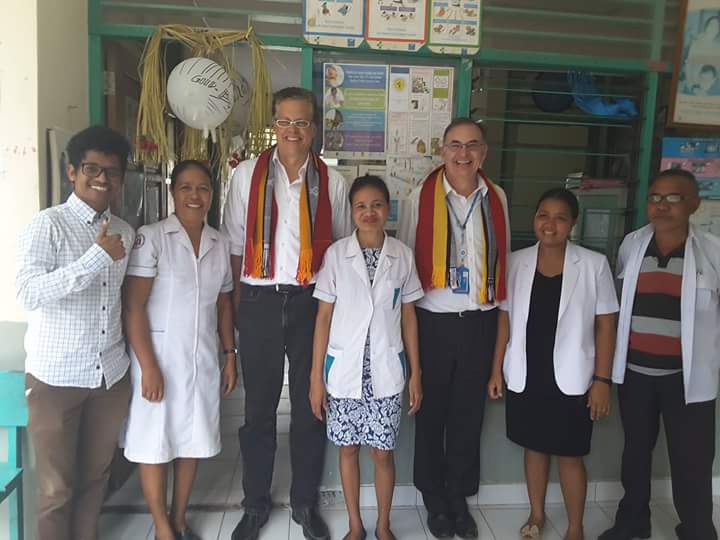
Agusto (far left) with WFP representatives in Timor-Leste
Talent drain
The main criticism of the model is that we risk robbing Peter to pay Paul… what’s the point of pulling out the best staff from one country if it leaves them too short on talent to realise the benefits of the original innovation we implemented? We think this argument has merit in very small ecosystems or where countries are in the absolute fledgling stages of implementation.
In the case of Agusto though, Timor-Leste had been building up a significant pool of users over several years with mSupply. Agusto is one of the best members of their team at SAMES but not the linchpin. We were confident that removing him from that environment would not leave Timor-Leste short on talent and that seems to have been borne out so far.
Visas
As Australians, we get used to turning up in a country and getting waved through the door. We have a ‘Passport Power’ rank of 7, meaning we have visa-free or visa-on-arrival entry into 161 countries around the world including nearly every country in our region. Timor-Leste? Their score is 47, with comparable easy entry into only 94 countries. Papua New Guinea fare even worse, with entry into just 78 countries – and that’s good, compared with Nepal (where mSupply started and still maintains an office), with a power score of 86 allowing them entry into just 47 countries.
That doesn’t mean staff from these countries are blocked from entry but it means they can’t nonchalantly turn up and work it all out post-arrival. In Agusto’s case, it took about a month to secure an annual working visa.
Transit visas
Gah – transit visas. These are hugely frustrating but they’re not going away. From many countries (including Timor-Leste) even if they are not leaving the airport on their way through Australia, they will need a transit visa. These are obtained via the local embassy/high commission in their home country but we’ve found them to be processed fairly quickly – within a few days.
On Agusto’s first trip with us (to Vanuatu), to help with a short-term training course, we got the rules wrong but somehow managed to get a last minute one-off exemption for him.
Accommodation
Put simply, we got really lucky on accommodation. Accommodation is not just expensive in a lot of places but it goes without saying that there are no Timorese ex-pats (that we know of) living in Honiara. We knew that finding housemates who are a good fit would set Agusto up for an enjoyable year… thanks to some planning by a friend of ours 2 months in advance, Agusto found a great room in a house shared by two Pacific Islanders and a Japanese volunteer. The combination of cultures works well and Agusto has an instant group of friends in the city.
Cash (including in transit)
International credit cards. Most of the population in low-resource countries have no access to them and without them, accessing cash quickly overseas is really difficult. Carrying wads of cash is risky and inevitably results in losing money through poor exchange rates. As soon as Agusto arrived in Solomon Islands, we arranged for him to be given some local cash by a mutual friend, to tide him over. Agusto then went with a local counterpart to a Solomon Islands bank on the first day in country to start the process of setting up a bank account (which can be laborious in some countries). Within a few days, he had a local card and we could start paying him into it. This can’t wait – everyone needs to be able to access money but we Australians can now take this for granted with international credit cards and access to ATMs in every country.
The other issue is while Agusto is in transit. Neither his accounts in Timor-Leste or Solomon Islands allow Agusto to access cash in other countries and with transits home that can be up to 24 hours, money is necessary for food and/or accommodation (as well as for unexpected baggage fees, when we accidentally booked him on a domestic Tiger Air flight from Brisbane to Darwin!). We solved this initially by arranging for him to be given cash by mutual friends – but this is not always practical or possible. We are now arranging for him to receive a ‘travel’ visa card that we can top up remotely. The fees on these cards are high but they are useful for ensuring that Agusto always has a couple of hundred dollars of emergency funds available.
Language
Unfortunately, language barriers are probably insurmountable for longer-term engagements. Whilst shorter training courses can be supplemented with translators, this is not viable over 12 months (much of it spent in the field). It was vital that Agusto was able to speak fluent English and this is an important skill to assess.
Trips home
Agusto has a wife and young daughter who have not accompanied him to Solomon Islands. Whilst they have a strong network of support around them, the separation is emotionally difficult for them. Wealthier consultants may supplement official trips with personal trips home but this is not necessarily viable for staff from lower-resource countries. We budgeted an additional trip home into Agusto’s contract to at least give him some opportunity to connect with his family. Over longer engagements, we think this is the fair and right thing to do.
